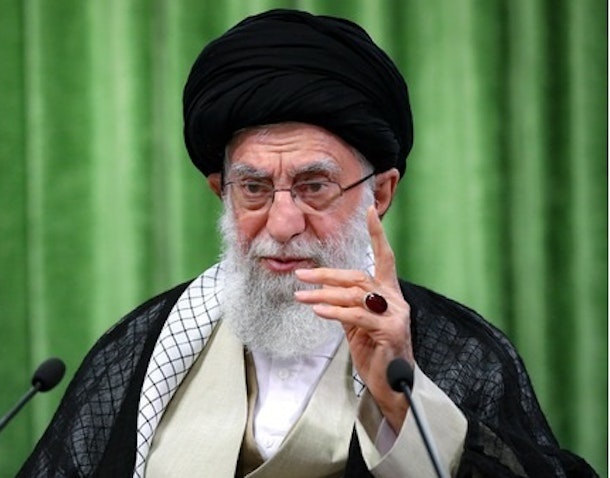While Russia and Iran publicly portray themselves as strategic partners—especially in shared theaters like Syria—their relationship is characterized by a deep undercurrent of mistrust, particularly in intelligence and security domains. Both nations, while cooperating against common Western adversaries, maintain robust intelligence services that monitor each other closely. We underline the absence of trust between Russia and Iran, focusing on the hostile espionage Tehran conducts within Russia, Iran’s primary intelligence objectives on Russian soil, and compares these activities with the more expansive and institutionalized Chinese espionage presence in Russia.
1. Background: Russia-Iran Relations and the Intelligence Dimension
Russia and Iran’s diplomatic and military collaboration has intensified since the mid-2000s, climaxing during the Syrian Civil War where both supported the Assad regime. This cooperation, however, sits atop a long history of rivalry and suspicion:
- Historical Context: Russia’s imperial legacy and Soviet-era interactions with Iran involved covert competition, territorial disputes, and ideological clashes. Though both governments have shifted since then, lingering suspicions persist within intelligence circles.
- Geopolitical Ambitions: Iran aims to be the dominant power in the Persian Gulf and Middle East, while Russia seeks to maintain influence over Eurasia and its southern flank. Their overlapping ambitions sometimes clash.
- Intelligence Services: Russia’s Federal Security Service (FSB), Foreign Intelligence Service (SVR), and military intelligence (GRU) operate with significant autonomy and vigilance over foreign intelligence threats, including Iranian activities. Iran’s Ministry of Intelligence and Security (MOIS), the Islamic Revolutionary Guard Corps (IRGC), and Quds Force engage in extensive foreign intelligence operations, including inside Russia.
- Mutual Suspicion: Despite public partnership, Russian intelligence remains suspicious of Iran’s growing influence and espionage activities within Russia, viewing some Iranian intelligence gathering as covertly hostile.
2. Iran’s Hostile Espionage in Russia: Objectives and Methods
Iran’s intelligence activities in Russia focus on advancing Tehran’s national security, economic interests, and regional strategies, often at odds with Russian priorities.
Key Intelligence Goals of Tehran:
- Military and Technical Intelligence Gathering:
- Iran closely monitors Russian military deployments, especially in regions critical to Iran’s security, such as the Caucasus and Central Asia.
- Tehran seeks to acquire advanced Russian military technologies through espionage to bolster its defense industry, often circumventing international sanctions.
- Economic and Sanctions-Related Intelligence:
- Iran uses espionage to identify loopholes and channels to circumvent Western sanctions affecting both countries.
- Iranian agents target Russian energy companies, financial institutions, and trade networks to support Tehran’s economic resilience.
- Political Intelligence and Influence:
- Iran closely watches Russian political factions and officials, aiming to influence policies favorable to Tehran.
- The Iranian diaspora in Russia is monitored and leveraged for intelligence and influence operations.
- Countering Russian Operations Against Iran:
- Iranian intelligence seeks to preempt and disrupt Russian efforts that might undermine Iran’s foreign operations or expose Iranian agents.
Operational Methods:
- Use of Diplomatic Immunity:
- Iranian intelligence operatives often operate under diplomatic cover in Moscow and other major Russian cities.
- Cyber Espionage:
- Tehran has invested heavily in cyber capabilities, conducting targeted cyber intrusions into Russian military, governmental, and scientific institutions.
- Human Intelligence (HUMINT):
- Recruiting and handling agents within Russian institutions and diaspora communities.
- Surveillance and Counterintelligence:
- Close monitoring of Russian intelligence activities against Iran to protect Iranian assets.
3. Comparison with Chinese Espionage in Russia
China’s espionage efforts in Russia are significantly larger in scale, better funded, and more deeply integrated into state strategies reflecting Beijing’s long-term ambitions.
- Scale and Scope:
- China deploys a vast network of intelligence officers, business operatives, academics, and students as covers in Russia.
- Chinese espionage spans military, economic, scientific, and political domains.
- Focus Areas:
- Priority targets include Russian advanced military technology, nuclear research, aerospace developments, and dual-use technologies.
- Chinese operations seek to bridge gaps in Beijing’s indigenous technological development and secure energy supplies.
- Operational Sophistication:
- China utilizes highly coordinated cyber espionage campaigns alongside traditional HUMINT.
- Chinese companies closely linked to the state act as intelligence fronts.
- Integration with Economic Policy:
- Beijing’s espionage is closely tied to its Belt and Road Initiative and other economic outreach programs in Russia.
- Russian Response and Ambiguity:
- Russia is wary of China’s espionage but maintains complex economic and strategic ties that complicate overt countermeasures.
- While some Chinese espionage cases result in diplomatic friction, the relationship remains pragmatically managed.
4. Consequences of Espionage for Bilateral Trust
- Russia-Iran Trust Deficit:
- Iranian espionage activities undermine Russia’s confidence in Tehran as a reliable partner, especially in security cooperation.
- Russian intelligence services keep Iranian operatives under constant scrutiny, sometimes leading to diplomatic incidents.
- Iran’s Strategic Calculus:
- Tehran balances its public alliance with Russia against its need to secure independent intelligence and economic advantages.
- Chinese Espionage as a Strategic Challenge:
- The sheer scale of Chinese espionage in Russia provokes long-term concern over technology loss and economic infiltration.
- Russia’s management of this espionage threat reflects a pragmatic acceptance given deep economic interdependence with China.
- Impact on Regional Security:
- Espionage and distrust complicate joint efforts, including in Syria and Central Asia.
- Mutual suspicion can drive competitive intelligence operations that may escalate tensions.
The intelligence rivalry between Russia, Iran, and China underscores a significant absence of trust that complicates these states’ public alliances. Iran’s focused but hostile espionage in Russia aims to secure Tehran’s survival and regional ambitions but creates friction with Moscow. In contrast, China’s expansive and sophisticated espionage activities reflect broader strategic goals of technological and economic dominance, representing a more systemic challenge to Russian interests. Understanding these dynamics is crucial for assessing the real state of Russia’s foreign partnerships and the covert contests shaping Eurasian geopolitics.
1990s – Early 2000s
- Iranian Intelligence Penetration Attempts in Post-Soviet Russia:
Following the Soviet collapse, Iranian intelligence begins establishing a presence in Russia, focusing on monitoring Russian military exports and diaspora communities. Early HUMINT efforts target Russian military scientists and former Soviet nuclear personnel. - Chinese Espionage Foundations:
China ramps up intelligence operations targeting Russian military and scientific establishments amid Russia’s economic vulnerabilities. Beijing’s interest in acquiring Soviet-era technology grows.
2006
- Iranian Cyber Espionage Emerges:
Reports surface of Iranian cyber operations targeting Russian government networks to gain intelligence on military deployments and energy infrastructure. This period marks Iran’s increasing cyber capabilities aligned with its strategic goals.
2013
- Russian Arrest of Iranian Agents in Moscow:
Russian FSB arrests a group of alleged Iranian intelligence operatives accused of spying on Russian military installations and recruiting local informants. This incident publicly exposes the tense intelligence rivalry.
2014
- Chinese Cyber Espionage Campaigns Intensify:
Sophisticated cyber attacks attributed to Chinese intelligence target Russian aerospace and defense firms. These operations aim to extract blueprints and R&D data to accelerate Chinese military modernization.
2016
- Iranian Espionage Related to Sanctions Evasion:
Iranian agents are reportedly involved in monitoring Russian trade and financial sectors to identify and exploit loopholes in Western sanctions, facilitating Iran’s import and export channels.
2018
- Russia Expels Iranian Diplomats:
Amid rising tensions, Russia expels several Iranian diplomats suspected of espionage activities. This diplomatic action underscores Moscow’s frustration with Tehran’s intelligence tactics.
2019
- Chinese Spy Ring Uncovered in Moscow:
Russian authorities announce the dismantling of a Chinese espionage network operating under academic and commercial covers, tasked with stealing military and technological secrets.
2020
- Iranian Cyber Intrusions During COVID-19 Pandemic:
Iranian intelligence escalates cyber espionage efforts targeting Russian health and scientific institutions involved in vaccine development and pandemic response, attempting to gain medical and technological intelligence. - Chinese Economic Espionage in Strategic Sectors:
Beijing’s intelligence agencies increase HUMINT and cyber operations targeting Russian energy firms and critical infrastructure, blending espionage with broader economic influence campaigns.
2022
- Heightened Russia-Iran Intelligence Frictions Amid Ukraine Conflict:
With Russia’s focus on the Ukraine war, Iranian intelligence intensifies operations in Russia to capitalize on diverted attention, seeking military and political intelligence to reinforce Tehran’s position in Syria and the Middle East. - Chinese Espionage Expands in Russia’s Far East:
Chinese agents increase infiltration efforts in Russia’s Far East, targeting natural resource sectors and advanced technology firms, reflecting Beijing’s strategic interest in the region.
2023
- Russian Counterintelligence Crackdowns:
Russia steps up arrests and expulsions of Iranian and Chinese intelligence operatives, signaling growing concern over the scale of foreign espionage. - Cybersecurity Enhancements and Intelligence Rivalries:
Both Tehran and Beijing increase cyber campaigns against Russia while Russian counterintelligence improves detection and mitigation capabilities, intensifying the espionage dynamic.
Summary
This timeline reveals a pattern of sustained espionage efforts by Iran and China in Russia, characterized by:
- Iran’s targeted, often hostile intelligence campaigns aiming at military, economic, and diaspora-related goals.
- China’s large-scale, systemic espionage targeting Russia’s high-tech, military, and energy sectors.
- Russia’s ongoing struggle to balance diplomatic relations with protecting national security against these intelligence incursions.
Priorities of Iranian Espionage in Russia (Based on Leaked FSB Documents and Investigative Sources)
1. Military-Technical Intelligence Gathering Iranian intelligence agencies prioritize the acquisition of advanced Russian military technologies. These include:
- Turbojet and aircraft engines;
- Missile systems and related technologies;
- Radio-electronic warfare equipment;
- Unmanned aerial vehicles (UAVs);
- Dual-use energy and aerospace systems.
This reflects Tehran’s need to modernize its defense sector under sanctions pressure. FSB analysis (2024) explicitly names Iran among the top foreign actors seeking to obtain these technologies covertly.
2. Recruitment of Russian Specialists Iran actively seeks to recruit Russian engineers, defense researchers, and technicians. Recruitment tactics include:
- Inviting specialists to Iran under academic or business pretexts;
- Offering paid lectureships or short-term technical consultancies;
- Gradually luring targets into transferring classified or sensitive know-how.
The FSB reports emphasize Iranian intelligence success in extracting expertise through personal and ideological appeal, as well as financial incentives.
3. Economic and Sanctions-Evasion Intelligence Tehran deploys operatives to:
- Identify vulnerabilities in Russia’s sanctions compliance mechanisms;
- Monitor trade and financial institutions to find export routes for restricted goods;
- Gain insight into Russia’s own sanctions strategies to mimic or exploit them.
These activities support Iran’s broader objective of resisting international isolation.
4. Influence Operations via Religious and Diaspora Networks Iran uses religious and cultural outreach to:
- Promote pro-Iranian sentiment among Russia’s Muslim (particularly Shiite) populations;
- Shape religious discourse through clerics and mosques aligned with Tehran;
- Recruit informants from within Iranian student, clerical, and business communities.
Russian authorities see these efforts as soft-power fronts for intelligence collection and ideological positioning.
5. Cyber and Covert Operations Iranian cyber units (linked to MOIS and IRGC) conduct intrusions against Russian:
- Military institutions;
- Scientific research centers;
- Industrial firms and infrastructure.
These operations are coordinated from Tehran but also supported by personnel based in the Iranian embassy in Moscow, often under diplomatic cover.
6. Counter-Intelligence and Surveillance of Russian Activities Tehran seeks to monitor and preempt Russian counterintelligence actions, including:
- Surveillance of FSB and GRU operations targeting Iranian interests in Russia;
- Monitoring Russian attempts to limit drone and nuclear tech transfers to Iran;
- Tracking internal policy discussions that could impact Iran-Russia cooperation.
This defensive espionage posture reveals Iran’s uncertainty regarding Moscow’s long-term intentions.
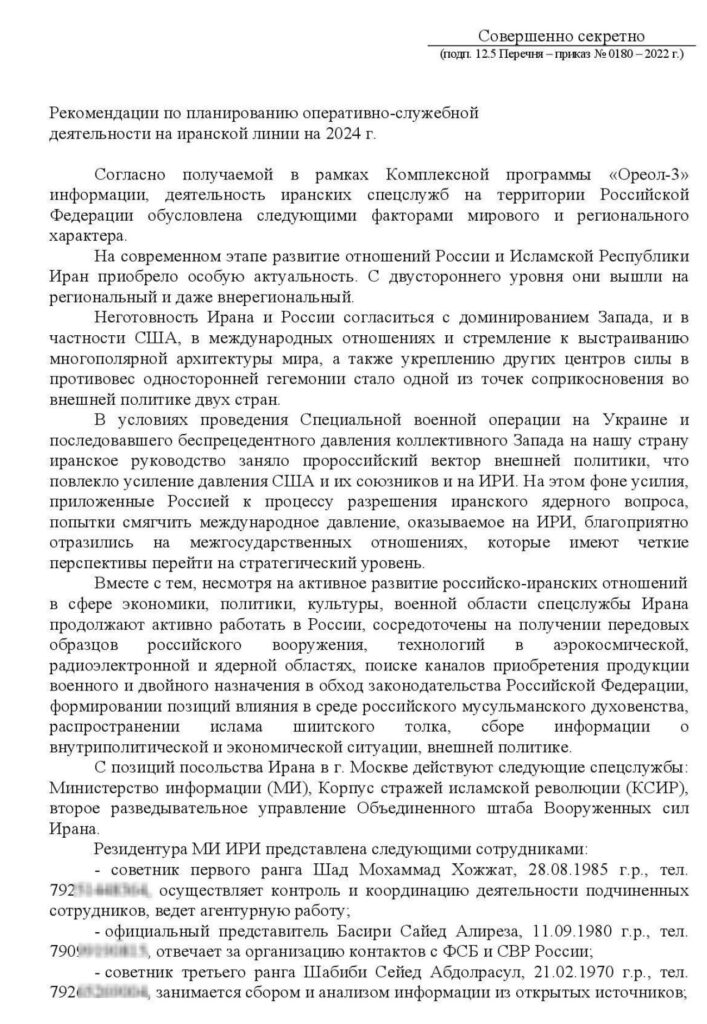
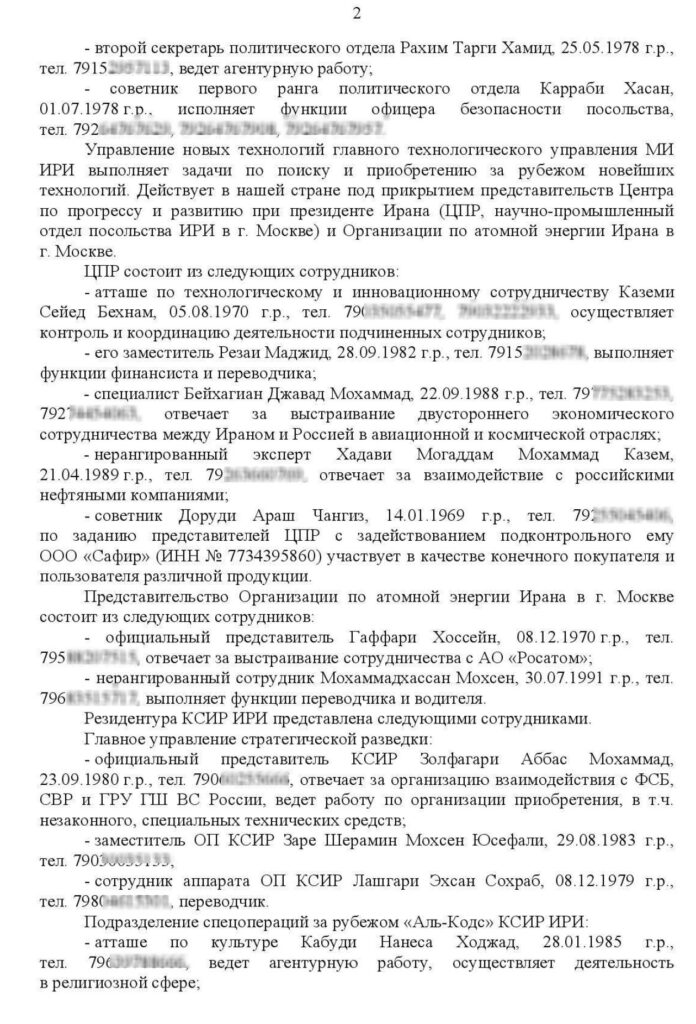
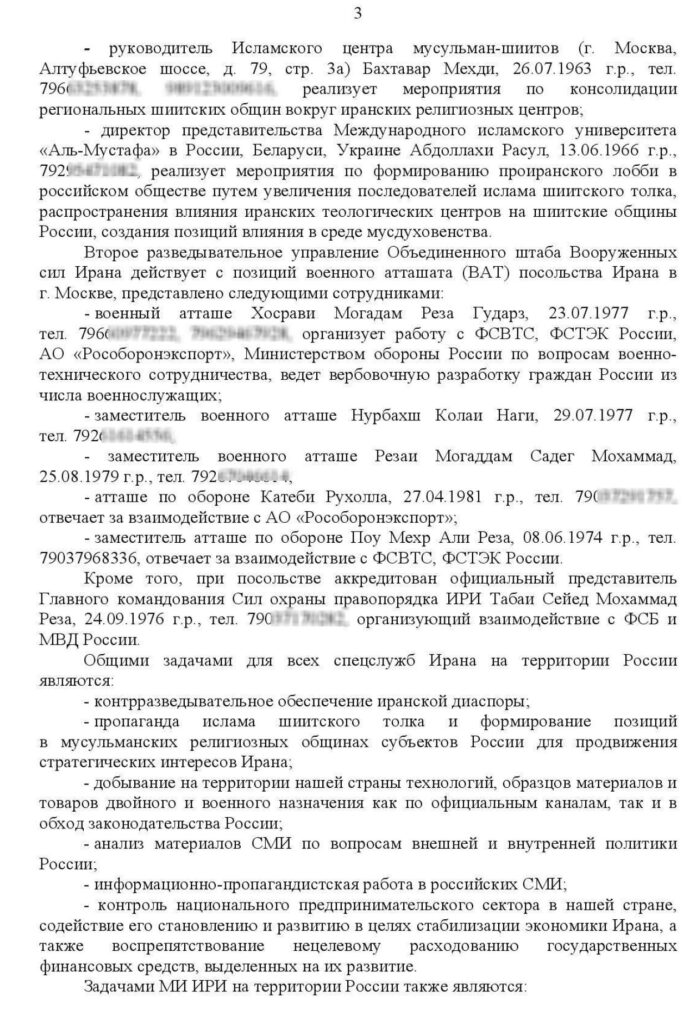
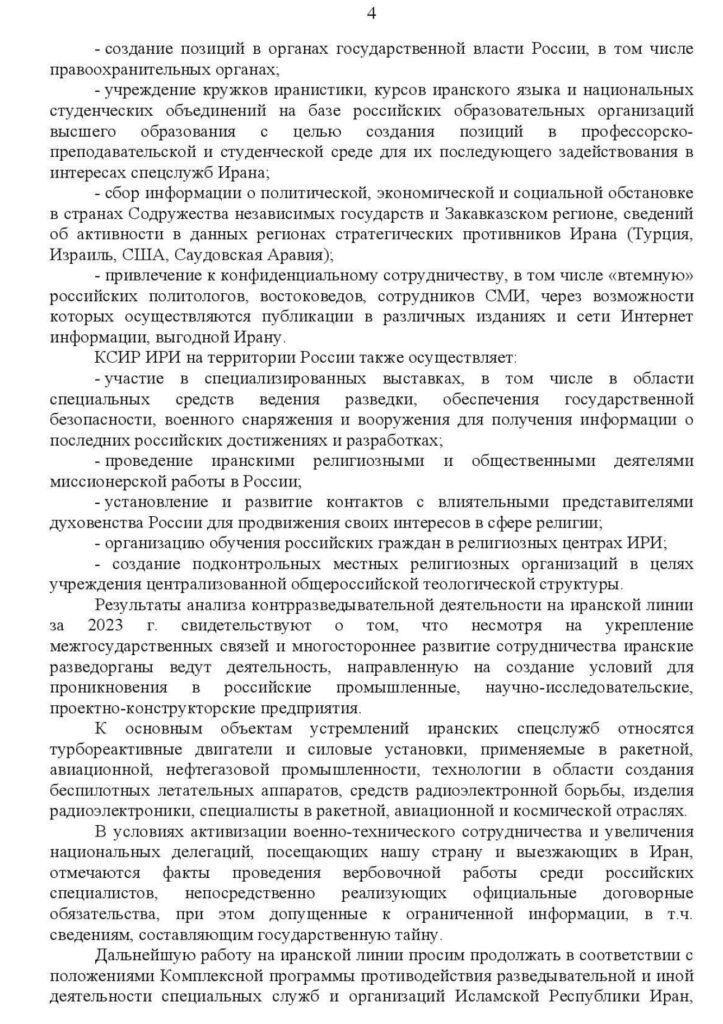
Summary Table: Iranian Intelligence Priorities in Russia
| Priority Area | Description |
| Military-technical intelligence | Acquisition of UAVs, missile tech, aerospace systems |
| Specialist recruitment | Targeting Russian engineers and scientists via soft inducement |
| Economic/sanctions intelligence | Mapping trade routes and financial vulnerabilities |
| Religious/diaspora influence | Using Shiite networks for outreach and recruitment |
| Cyber operations | Digital intrusions into Russian defense and industrial sectors |
| Counter-intel monitoring | Tracking FSB/GRU efforts to limit Iranian strategic scope |
This confirms that Iran’s espionage strategy in Russia is multi-layered, blending classic HUMINT and cyber capabilities with religious diplomacy and covert recruitment. The FSB sees these operations as covertly hostile and long-term in nature, despite Iran’s formal alliance with Moscow. These activities undermine bilateral trust and highlight the latent tension within the broader Russia-Iran partnership.

More on this story: Russia Exploits the IAEA to Steal Chinese Nuclear Technology

More on this story: Bear Meets Dragon: The Escalating Espionage Rivalry Between Russia and China

More on this story: The Kremlin, Under Pressure from Iran, Spreads Shiism on Its Territory


